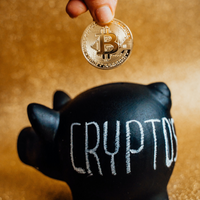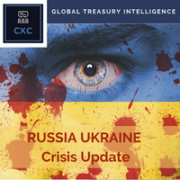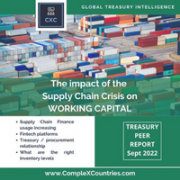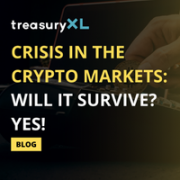Binance and regulatory scrutiny: changing times for the crypto market
28-09-2021 | Carlo de Meijer | treasuryXL
Long-time regulators were not sure on if at all or how to handle the crypto ecosystem. But that has changed fundamentally with the crypto industry witnessing massive growth and interest from traditional institutions and major investors.
This year has been a year of increased regulatory focus of the booming crypto market. The potential for crypto exchanges to launder money has worried regulators all over the world, with US Treasury Secretary Janet Yellen and ECB President Christine Lagarde among those to voice concerns. As a result regulators and law enforcement agencies worldwide have begun to scrutinise suspect players and started to write regulations to bring those players within the blockchain arena to take control of them.
Recently the world’s largest crypto platform, Binance has come under regulatory fire. Regulators across the world are concerned over the potential for crypto to be used to launder money as well as the risks to consumers from volatile crypto trading. Most recently also DNB, the Dutch Central Bank, joined forces, saying Binance was not compliant with anti-terrorism financial law. It is unclear if this is a coordinated effort by regulators or something closer to a domino effect.
Regulatory scrutiny
Financial regulators across the world have now targeted major cryptocurrency exchange Binance. The platform has come under increased scrutiny from a growing number of regulators worldwide, including regulatory authorities from the UK, US, the Netherlands, Canada, Japan, Malaysia, Thailand, Germany, Cayman Islands, Lithuania, Hong Kong. And this group is growing.
The platform has faced warnings and business curbs from financial watchdogs who are concerned over the use of crypto in money laundering and the high risks of their products to consumers. Binance has also been accused of accepting ‘gigantic tips’ from creators of ‘questionable’ cryptocurrencies in exchange of receiving a privileged place on their platform. Several countries have announced investigations in Binance and its products. While a number of countries have banned the platform from certain activities, quite a few countries have started banning it completely.
Banks are delisting Binance
Not just countries, but also a growing number of banks are cutting ties with the crypto exchange as well. Several banks or payment processors, primarily in Europe and the UK, have subsequently cut off the exchange, potentially freezing its customers’ accounts. Major banks began to ‘delist’ Binance in June and July of 2021, leading the exchange to suspend withdrawals and/or limit withdrawals dramatically on most accounts.
A number of banks, including Barclays, Nationwide, HSBC and Santander pulled Binance’s access or announced reviews of their approach to crypto at large. HSBC banned its UK customers from making any further payments to Binance, while Barclays suspended UK card payments to Binance, citing the FCA warning to customers. Also the European Union’s Single Euro Payments Area appears to have (temporarily) cut off Binance. SEPA payments to Binance were halted.
Regulators and Binance: some approaches
US
The largest of investigations is perhaps be through the US Commodity Futures Trading Commission (CFTC), with the regulator seeking to determine whether cryptocurrency derivatives were bought and sold by US citizens on the Binance platform. Binance is also reportedly under investigation by the US Justice Department and Internal Revenue Service (IRS).
Cayman Islands
The Cayman Islands also challenged the lack of authorization of the exchange. Cayman Islands Monetary Authority (CIMA) said that all the entities associated with Binance are not registered, licensed, or regulated and thus not authorised to operate a crypto exchange “from or within the Cayman Islands“.
UK
Last week UK’s Financial Conduct Authority (FCA) stated that it is ‘not capable’ of effectively supervising the world’s largest crypto currency exchange, Binance. They also reiterated the risk its products could pose to customers. The FCA decided to ban the exchange from conducting all regulated activity in the UK for failing to report in line with its ant-money laundering (AML) regulation. The FCA also stated that Binance has refused to answer questions about its wider global business model, and ‘refused or was unable’ to provide (high-risk financial) products offered on Binance, such as their Binance Stock token.
DNB
De Nederlandsche Bank (DNB), the Dutch Central Bank, announced that Binance is providing crypto services in the Netherlands without the required legal registration. As a result the platform was not in compliance with the Dutch anti-money laundering and anti-terrorist financing Act. And thus Binance is illegally offering services for the exchange between virtual and fiduciary currencies as well as illegally offering custodian wallets. This may increase the risk of customers becoming involved in money laundering or terrorist financing.
Japan
Considered to be among the most crypto-forward countries, Japan’s Financial Services Agency (FSA) also warned Binance. It mentioned that the crypto exchange is not registered to accept business from Japanese residents, within the country, ordering to suspend operations.
Hong Kong
Hong Kong’s Securities and Futures Commission (SFC) notified that Binance’s offering of investing in Stock Tokens is not a regulated activity. Binance has not taken any license to offer the services to HK residents.
Malaysia
In June Binance was subject to enforcement actions by the Securities Commission Malaysia for alleged illegal operations. It was ordered specifically to disable Binance.com and mobile applications in the country from June 26 onwards. It was also told to stop media and marketing targeting Malaysian consumers and to restrict access to Binance Telegram group.
Thailand
Thailand’s Securities and Exchange Commission (SEC) notified that it has filed a criminal complaint against Binance. It stated that an investigation has been launched against the exchange for operating its business without a license.
What is Binance?
Crypto exchange Binance was established in 2017 by Chinese-Canadian entrepreneur Changpeng Zhao. Binance offers trading in over 500 cryptocurrencies and virtual tokens. Thanks to its own cryptocurrency BNB the Binance platform has a large group of loyal customers. They get a discount when trading/using BNBs.The crypto exchange offers a wide range of services to users across the globe, from cryptocurrency spot and derivatives trading to loans and non-fungible tokens. It also offers services around trading, listing, fundraising and de-listing or withdrawal of cryptocurrencies. Binance’s corporate structure is ‘opaque’ (non-transparent), though its holding company is registered in the Cayman Islands, according to British court documents and Malaysia’s watchdog. This might have contributed to today’s massive regulatory scrutiny.
Measures taken/announced
Binance is undergoing big changes to appease regulators, who are unhappy with some of the exchange’s products and their compliance with local rules. Therefore they have made regulatory compliance its top priority. In the wake of the regulatory pressure from various countries
Binance announced that they will be taking drastic steps to better meet financial regulations, improve user protection and manage risks, including strengthening their compliance and legal teams, banning or scaling back products, demand stricter background checks, change the business model and improve relations with regulators.
Focus on regulatory compliance
Binance is focusing on regulatory compliance as ‘the exchange pivots from a technology start-up into a financial services company’ CEO Zhao explained.
For that they unveiled a series of measures it is going to take to become what it says is a fully compliant and licensed institution in all countries it operates in, as fully licensed competitors continue to appear.
“Compliance is a journey – especially in new sectors like crypto. The industry still has a lot of uncertainty. We also recognize that with the growth comes more complexity and more responsibility”. CEO Zhao
Strengthening compliance and legal teams
Binance is strengthening their compliance and legal teams, by hiring more staff who have relevant regulatory compliance experience as well as very senior people ‘that can bring teams in’. Binance highlighted that the exchange has increased its international compliance team and advisory board by 500% since 2020. Binance declared that they are planning to double the size of their compliance team within this year.
Recent appointments
Binance recently announced it was hiring a number of former regulators to its compliance and executive teams. They recently announced the appointment of Richard Teng – former chief executive officer (CEO) of Financial Services Regulatory Authority at Abu Dhabi Global Market (ADGM) – as its new CEO, Singapore.
This announcement comes barely a week after the hire of former US treasury criminal investor, Greg Monahan, as its global money laundering reporting officer (GMLRO) – a move that seeks to clear up Binance’s ongoing money laundering issues. Binance also appointed Samuel Lim, who has over 10 years of experience in compliance in investment banking, as chief compliance officer and Jonathan Farnell, with over 20 years of experience in the UK financial and payments sector, as director of compliance.
Banning or scaling back products
Binance is shifting its commercial focus to other product offerings that will better serve its users for the long term. Binance has scaled back some of its range of crypto products that regulators may oversee. To make sure that all their products are fully compliant, Binance has been limiting their futures, derivatives products in most of Europe, with users in Germany, Italy and the Netherlands among those first affected. It has also restricted the trading of derivatives in some parts of Asia as well such as by Hong Kong users. Binance also would stop offering crypto margin trading involving the Australian dollar, euro and sterling.
“We need to make sure that all of our products are fully compliant … This is why we’ve been limiting our futures, derivatives products in most of Europe and some parts of Asia as well.” CEO Zhao
In July, Binance also stopped offering/selling digital tokens linked to shares like Apple Inc. and Tesla Inc. after regulators raised concerns about the products for appearing to violate local securities regulations. Hong Kong’s markets regulator became the latest regulatory body to warn investors about Binance’s stock tokens. These crypto products will be unavailable for purchase on Binance effective immediately. Customers who own the tokens may sell them over the next 90 days, and Binance will cease to support the products on Oct. 14, the exchange said.
Reduce withdrawal limits
Orders from regulatory authorities in different nations have caused Binance to reduce its non-KYC withdrawal limits. In an official announcement, Binance notified customers that the withdrawal limit for users with basic verification will drop to 0.6 Bitcoin in mid-August. This is in an effort to prevent money laundering and curb broader criminal activities happening through the platform.
Stricter background checks
Pressure from regulators globally also forces Binance to demand stricter background checks on customers to bolster efforts against money laundering, with immediate effect. This should further enhance user protection and combat financial crime. Until now, document-based ID checks at Binance were only required for users seeking higher limits on trading.
Steps taken by crypto exchanges to make identity and background checks remain varied, with some demanding full documentation and others allowing users to sign up for accounts with as little as an email address. Many large platforms also require users to submit ID documents, while others only require personal information for limited access to trades.
From now on, Binance users will have to complete a verification process to access its products and services. Users will now have to upload an ID card, driver’s license or passport to prove their identity. Those who have not done so will only be able to withdraw funds, cancel orders and close positions. The move represents a major shift by Binance.
Changed business model
Binance also plans to make a series of fundamental changes in its corporate structure to ‘get back into the good books’ of the regulators in the various regions to handling increased scrutiny from regulators. The company is going to have to totally overhaul its business model by institutionalising and centralising its digital asset operations. The crypto exchange has until now had decentralized operations, meaning it doesn’t have headquarters of any sort. Instead, they will now add headquarters around the world and work towards being licensed everywhere and become compliant as much as it can in every region where it plans to operate. Each of these headquarters would have regional CEOs as well leading to a centralized authority controlling all these subsidiaries. While this goes against what cryptocurrencies stand for, it is necessary for Binance to stay relevant in many countries.
Improve relations with regulators
Binance CEO Zhao also wanted to improve relations with regulators. Zhao’s focus on regulation is seen as a sign of the changing times in the crypto world. The CEO asserted that new laws are necessary for the crypto ecosystem to support its further development.
The firm is willing to work and communicate with regulators to bring compliance into the crypto ecosystem. For that Binance will expand the team dedicated to working with authorities to ensure services are compliant with local regulations. Binance is also willing to meet regularly with regulators to proactively update them on what the firm is doing. To start, Binance would share some user data with local regulators.
“We aim to work more collaboratively with policy-makers to improve global standards and discourage bad actors,” Binance CEO Changpeng Zhao
Is this enough?
Notwithstanding the various measures announced or taken by Binance there is still a lot of sceptics around Binance real intentions. In the crypto world it is still like the Wild West with many ‘ cowboys’ operating that are averse to rules. Some argue ‘the exchange is playing smart by trying to be compliant, having multiple entities, making influential hires, and more’. Others say ‘It is a nice marketing statement, but from the regulators’ perspective, this is not enough”. For them ‘it is a questionable approach to reportedly evading rather than complying with jurisdictional regulations’.
Still, some lawyers are skeptical over whether Binance move to tighten checks would convince regulators. Regulators would need to know which of Binance’s local entities run the know-your-customer process to audit and check if it complies with local laws. “Since they are doing it on a voluntary basis, regulators do not know whether they have the authority to supervise the identity check, and no one can look whether they are doing it properly.”
It is questionable if Binance is able to face the regulatory actions from so many countries and financial watchdogs at the same time. While Binance says it is intent on cleaning up its compliance image, it will take more than a few give-ins to the regulators to resolve the numerous bans and restrictions that it currently faces.
What may we further expect?
It is tough to say whether it is a coordinated attack on Binance with all the regulatory bodies are coming together against the exchange. Considering it is the biggest crypto exchange in the world and due to its sheer size, it may be expected that many more crypto platforms will come under intensified regulatory scrutiny.
Is this the beginning of a worldwide approach to regulate the whole crypto market? As one of the oldest and largest crypto platforms Binance symbolizes for the whole crypto ecosystem. What is sure, what happens to Binance may signal how regulators will approach crypto, with enforcement actions against the exchange hinting at what other platforms should expect.
In my mind, this is not a step-change in regulation of the ‘crypto world’. It is part of a growing trend of worldwide and collaborated regulatory intervention in crypto markets. As a consequence regulations are quickly becoming the most important aspect of any company in the cryptocurrency industry. As governments around the world continue to work towards developing regulatory frameworks for crypto, companies are constantly needing to adapt to continue operating.
Carlo de Meijer
Economist and researcher











